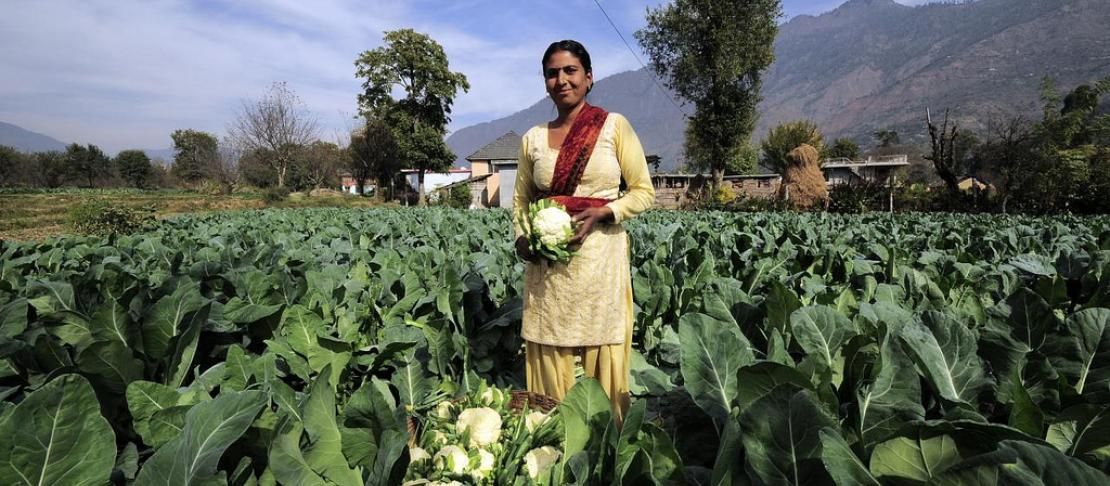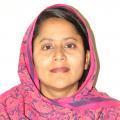Gender & Climate Change Small Grant Awards

CCAFS helped fund female scientists doing research in program priority areas
There has been limited understanding of how men and women adapt to climate variability and change to maintain food security in agricultural systems. In 2011-2012, funding was awarded to female scientists doing research on CCAFS priorities. Awarded scientists were provided partial supervision from CGIAR centres to write a paper on gender and climate change and the award will help improve research capacity of awarded scientist. This effort helped to demonstrate and contribute to understanding the linkages between climate change and gender more specifically, while developing policy-relevant findings on climate change, agriculture, and food security more generally. The objective was to build research capacity of women scientists in partner institutions and increase their representation in agricultural research.
Meet the Small Grant Awards recipients
East Africa
Annuciate Nakiganda
 Research topic: Enhancing the Adaptive Capacity of Men and Women Livestock Farmers to the Effects of climate change in Uganda. Download technical report
Research topic: Enhancing the Adaptive Capacity of Men and Women Livestock Farmers to the Effects of climate change in Uganda. Download technical report
In Uganda, there has been an increase of 1.3 degrees C in mean annual temperatures since 1960 and a decrease of annual rainfall by 3.4mm per month on average. Inadequate feed was identified as a major constraint to livestock production and this is exerbated by climate change. This has led to food insecurity. Climate change affects men and women differently, and hence, there is a need to do gender analysis on climate change interventions. The study aims at determining different effects of climate change on livestock production by women and men and identify gender sensitive adaptation strategies. The study will involve inception meeting, focus group discussions, key informant interviews, seasonal calendar, disaster trend analysis, production trends, coping strategy matrix, gender role analysis and baseline survey. Then on-farm trials of livestock technologies will follow. Project results will be disseminated through farmer exchange visits, field days, radio talk shows, news papers, conferences, workshops and journal.
Annunciate is a Research Officer at the National Livestock Resources Research Institute in Uganda.
Email: aknakiganda [at] yahoo [dot] co [dot] uk
Read more about Annuciate Nakiganda's ongoing research on our blog.
South Asia
Gulsan Ara Parvin
 Research Topic: Role of Microfinance Institutions to Enhance Food Security in the Climate Change Context: Gender based analysis of rural poor community of Bangladesh. Download technical report
Research Topic: Role of Microfinance Institutions to Enhance Food Security in the Climate Change Context: Gender based analysis of rural poor community of Bangladesh. Download technical report
This study aims to examine the impact of climate change on the food security of rural poor women and what Microfinance Institutions (MFIs) are doing to enhance their food security in climate change context. It investigates the changes in women’s daily labor and life style to ensure household food security in the climate change context. Further, by empirical study among rural poor women and MFIs in coastal areas of Bangladesh, it identifies the role of Microfinance Institutions to address the changes in the lives of rural poor women and to ensure their food security. Along with these, this study inspects the problems, constraints and expectations related to present forms of Microfinance Institutions to enhance food security of rural poor women. This is expected that this study would contribute to explore a new and expected model of Microfinance Institution to enhance food security of rural poor women in the climate change context.
Gulsan has a background in urban engineering but she has also worked on poverty alleviation, women's empowerment, climate change and disaster management, and participatory community planning. Gulsan is the chief researcher of Pathikrit, a Social and Human Development Non-Government Organization in Khulna, Bangladesh.
Email: niruurp [at] yahoo [dot] com
Read more about Gulsan Ara Parvin's ongoing research on our blog.
Nani Raut
 Research Topic: Role of Gender on Agricultural Intensification and its Contribution to Greenhouse Gas Emissions with Implications for Policy. Download technical report
Research Topic: Role of Gender on Agricultural Intensification and its Contribution to Greenhouse Gas Emissions with Implications for Policy. Download technical report
The majority of the Nepalese hill farmers have chosen crop intensification as an alternative approach for livelihood. It is crucial that role of gender in the intensification process be assessed considering that women in Nepal in more vulnerable position than men to changing climate ecosystem. The trend of excessive use of chemical fertilizers brought about by the intensification process has already made the soil acidic, which is a matter of concern for future production and food security. The increasing number of crops per year and increasing use of chemical fertilizers could lead to increase in green house gas emission (nitrous oxide and methane). Thus study will mainly focus on two aspects: a) assessing the gender role on agricultural intensification process which includes assessment on major involvement of men and women on different agricultural activities, and b) to analyze the effects of agricultural intensification on fluxes of nitrous oxide and methane which will be mainly the incubation study in the lab.
Nani is an expert in watershed management and rural water supply. Nani is currently enrolled as a PhD candidate at the department of International Environment and Development Studies at the Norwegian University of Life Sciences. She is affiliated with Kathmandu University in Nepal in the Department of Environment Science and Engineering.
Email: nani [dot] raut [at] umb [dot] no
Read more about Nani Raut's ongoing research on our blog.
West Africa
Arame Tall
 Research Topic: Reducing the Vulnerability of Women Rural Producers to Rising Hydro- Meteorological Disasters in Senegal: Are There Gender-specific Climate Information Needs? Download technical report
Research Topic: Reducing the Vulnerability of Women Rural Producers to Rising Hydro- Meteorological Disasters in Senegal: Are There Gender-specific Climate Information Needs? Download technical report
The past decade (1995-2005) has been characterized by increasing climate variability and more frequent extremes all over Africa. This study aims to reduce the gender-specific vulnerability of women rural producers in these communities. The research will examine whether there are gender-specific needs for climate information in communities at risk of flooding, drought and other hydro-meteorological disasters, and whether women’s specific vulnerability to these hazards could be mediated through an increased use of salient, timely and legible climate information. The results of this study will be critical for the climate research and development practice communities.
The research will focus on three community case studies in Senegal, and target women stakeholders including farmers, cattle-herders and fisherwomen. The fieldwork will investigate whether there are indeed gender-specific vulnerabilities to hydro-meteorological disasters and whether climate information matters in the context of primary sector production by women. If climate information is ascertained as a useful vulnerability-reducing strategy, the researcher will work with the women stakeholders to jointly design agro-meteorological advices that could meet women's specific information needs, with an aim to supporting better informed decision-making by women producers and more resilient livelihoods.
Arame has expertise community vulnerability to hydro-meteorological hazards and scientist-stakeholder dialogues as a means to increase the usability of climate/weather services for communities at risk from climate change. Arame is currently a fourth year Ph.D student at the Johns Hopkins University's School of Advanced International Studies (SAIS) where she pursues her research on the policy implications of climate change for Africa. She is affiliated with the National Meteorological Agency of Senegal.
Email: arametall [at] gmail [dot] com
Read more about Arame Tall's ongoing research on our blog.
Some Laeticia
 Research Topic: Analysis of gender barriers in the design and implementation of climate change related policy for agriculture and food security in Burkina Faso Download technical report
Research Topic: Analysis of gender barriers in the design and implementation of climate change related policy for agriculture and food security in Burkina Faso Download technical report
While it is recognized that women play an important role in agriculture, and food security at the household level, gender issues have been so far neglected in the climate change debate, both in the rural and urban areas. In Burkina Faso, women contribute to agricultural production and food security, while having in general limited access to livelihood resources. Addressing the equitable access to climate-proof technologies for men and women will improve the impacts of adaptation initiatives. This project aims is to promote gender perspectives into the current adaptation national policy and practices for agriculture and food security. It will provide evidence-based knowledge to policy makers to legally mainstream gender into climate change, agriculture and food security policy. This will be achieved through research activities including the review of gaps and barriers, field data collection and analysis, the development of technical guidelines and the contextualization of legal framework.
Some's expertise is in legal and human rights in relation to development and conservation. Some is working at the International Union for Conservation of Nature (IUCN) In Burkina Faso and provides legal expertise on development and conservation issues.
Email: somedioyel [at] gmail [dot] com
Read more about Some Laeticia's ongoing research in Burkina Faso on our blog.
Note: This project has terminated